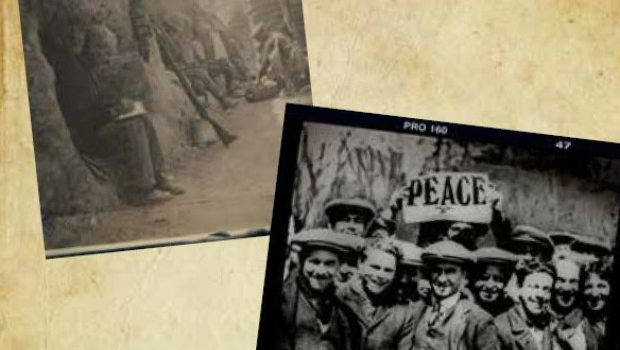Graeme Stephen presents Letters for Peace with the McFall’s Chamber String Trio as part of the Made in Scotland programme at Out of the Blue in Leith’s Dalmeny Street. It is a full theatre experience involving voice, song, photos and words with music dominating. In Stephen’s words, “I was at a gig in Wales and read a book about conscientious objectors during World War I. I was really touched and decided to write music for it.” The instrumentals are singing the words of the book.
This complicated, multi-layered piece shows all angles of the situation, and each part has a quality and tone which is relative to it. It is emotionally moving – struggling and insistent harmonies play while facts are displayed: 20,000 troops killed on the first day, 623,907 either wounded or dead at its conclusion. It begins and ends with a passage first spoken, then yearningly sung by Transylvanian Lizabett Russo in a pure trebling voice, “Last night I had the strangest dream and saw a mighty room full of men, and the paper they were signing said they would never fight again, and when a million were signed… put an end to war.”
Stephen, hunched over his amplified acoustic guitar, starts softly, accompanied by long slow notes drawn from the strings of Robert McFall (violin), Brian Schiele (viola) and Su-a Lee (cello). The violin takes over the high, thin melody and then the cello comes through, deep and bass. Swelling surges of sound billow and build as they play in unison, more powerful. The different instruments are a perfect foil for each other
This introduction heralds the first bleached yet naturalistic photos of the trenches – a man sits writing, absorbed, during a bleak lull. Alongside this: “I wish to offer a brief statement of my faith… I will not poison or kill… surer proof of those I love, than slaughter those others love” is a delicate solo with echoes of Spanish guitar.
There are hints of musical influences from that era, juxtapositions of syncopation, jazz echoes, classical overtones, Indian cadences, and, at times, more of a folk/pop sound – all is subtle, a really interesting interweaving of styles evoking wars of different eras.
Stories are told by each instrument, all being played alongside each other. Sorrow and grief are evoked with the strong surety of the message clearly coming through the composition. The music pleads because not everyone by any means agrees, it must be forceful at times.
In the tougher visuals three men huddle in a trench; a single man gazes out of a cell window; sombre faces gaze, dazed in their uniforms to the script: “War will not cease until men refuse to fight.” The cello plays pizzicato: simple but angry and atonal. The four players are beautifully timed together and perfectly match the spoken court speech, “If you find me guilty, you will inflict punishment on a man who has not committed any crime.”
Here are sonorous tones, clashing and challenging the ear; next, lonely and mournful, reflecting those who didn’t fight and therefore stand separate from the general population. Often the music quietens when the words are spoken, but passages repeat and then we can focus on a merging of the sound and meaning, each taking its own important place by turn.
This arrangement does two things. It encapsulates the complex emotions, and it creates the discord and disharmony of the men’s struggle. We are in no doubt about the seriousness of the subject – “The most fruitful outcome (for mankind) (Bertrand Russell) does not depend on force” – the strident strumming and chords, with the cello providing a rhythmic baseline, mirrors this – but the musicians appear to relish playing together and there is also hope and a joyfulness at the prospect of ending all wars.
